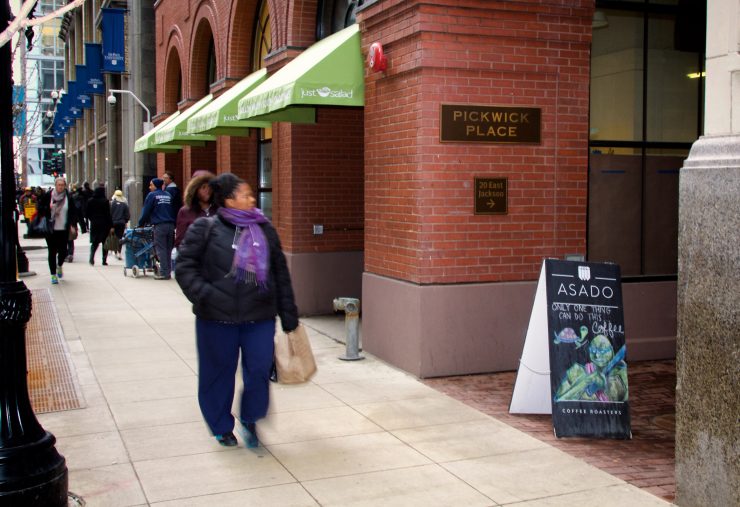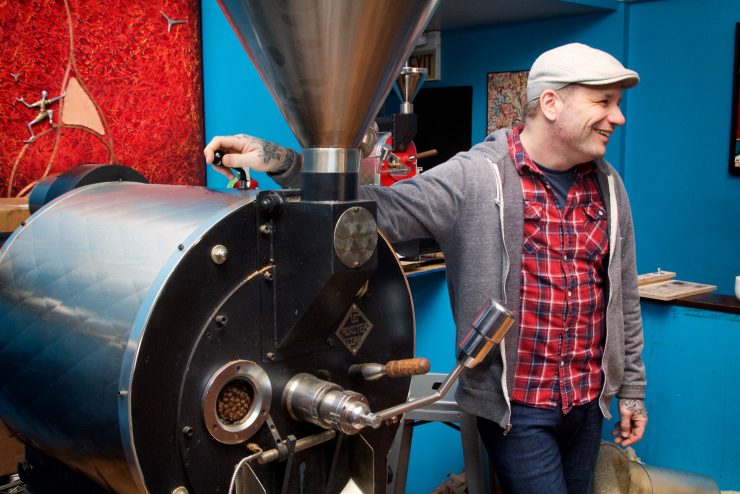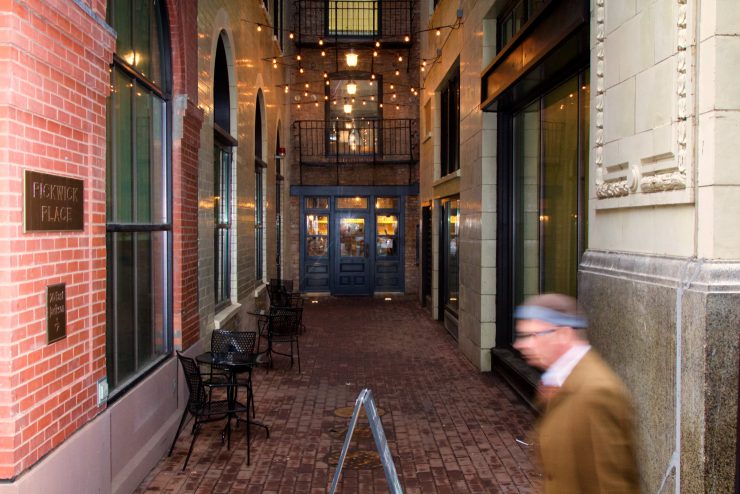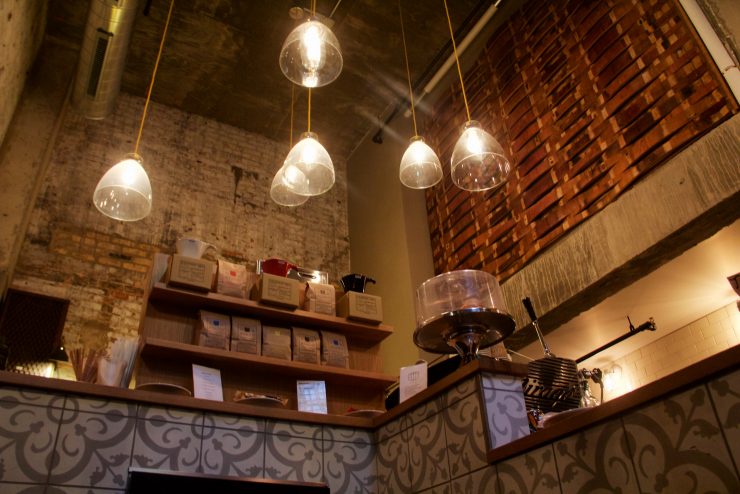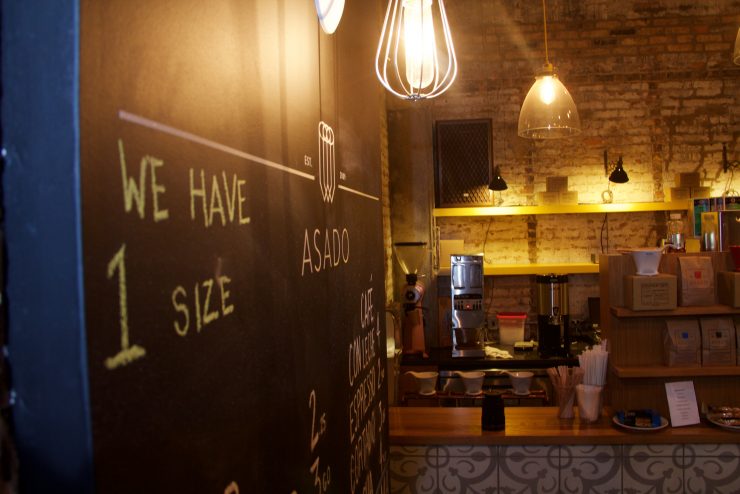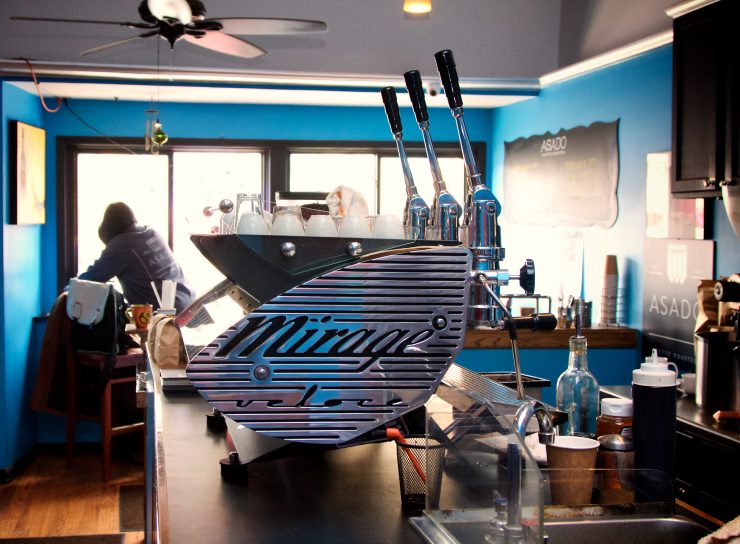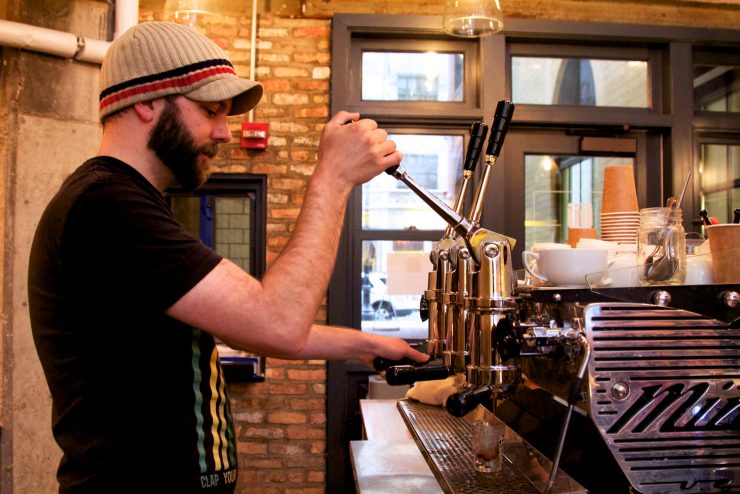Kevin Ashtari’s first roaster was a drum attached to a rotisserie motor that tumbled beans over a barbecue grill. How did that first batch turn out? “Burnt,” he says. “Set the beans on fire and burned a hole right through the drum.”
Undiscouraged, Ashtari hunkered down to figure out this roasting thing. Four attempts later he managed to get something drinkable; soon he was giving away beans. And from that inauspicious burnt start, the idea for Asado Coffee began to form.
Back in 2009 when Asado opened on the outskirts of the Lakeview neighborhood, Chicago’s specialty coffee scene was small. Intelligentsia and Metropolis were known, but Third Wave concepts mostly flew under the radar. Pour-over brewing at area cafes was rare; Asado not only embraced them, but completely eschewed batch brew altogether. Intelligentsia didn’t follow suit until months later.
By this point Ashtari had long since graduated from the barbecue roaster and moved on to a 12-kilo unit. His strategy then is the same as now: roast just enough to last two days. After that the beans are marked for cold-brew duty, and definitely nothing past two weeks. “By then, it’s just a memory of what it was…” he says, trailing off.
Locals began to take notice of both the brewing method and the quality. Within a year, both individuals and bean distributors began approaching with samples for him to roast up and try. Unfortunately despite the quality, Ashtari still had some uncertainty as to the sustainability of the business.
That’s when Jeff Liberman showed up. Initially he avoided the place. “Every place I’d go and try coffee would close out from under me,” he says. “I was the kiss of death.” But after a friend brought him a to-go cup from Asado, he was so impressed that he broke down and became a regular. He even offered to rebuild a part of the bar to make the pour-overs a focal point. His price? Free coffee for a year. Ashtari agreed, but six months later, he was considering shuttering the business. Liberman, worried about his year-of-coffee agreement, would have none of it. “He tried to burn me by closing!” Liberman complains. They ended up partners.
As a general contractor, Liberman knows plenty about expanding. He uses his mile-a-minute conversational speed to drum up interest, energetically networks with developers, and has taken the general operations and expansion duties off Ashtari’s list so he can focus on the coffee. It’s worked; through Liberman’s persuasion skills and Ashtari’s roasting, developers began approaching them to open cafes in various spots all over town. Eventually, they settled on their first expansion project: a cafe in Ukrainian Village.
Bright and modern, but still warm and relaxing (the fireplace helps), Asado’s Ukrainian Village cafe is situated on heavily trafficked Chicago Avenue. Just outside the door is a stop for the #66 bus, one of the busiest routes in the city. Rather than petition the alderman to move it, they took advantage: there’s a monitor by the door that continually displays the upcoming arrival times for buses heading downtown.
But it’s the recently opened third location that’s had people talking. Pickwick Place is a historical anomaly in downtown Chicago. Tucked away on East Jackson and surrounded on all sides by skyscrapers, the sudden appearance of a tiny 20×20 building at the end of a brick alley can seem unreal—that is, if you even happen to glance its way when walking past. It’s easy to miss, but the rewards for those who find it go beyond coffee and into a glimpse of history. You’ll see tired, jaded downtown workers spot the small Asado sign and follow its direction with a furtive glance down the alley, then suddenly stop in their tracks, gaping at what looks like a window through time to 100 years ago.
Stepping inside, the warm light and tight space makes you feel like you’ve entered a European apothecary from the turn of the nineteenth century, though the incredibly high ceiling and the gleam of the Kees van der Westen Mirage espresso machine are nods to modernity. The Mirage is Asado’s standard across all its cafes, specifically the spring-lever driven Idrocompresso model. Kevin admits its aesthetic was the first thing he noticed. “But I was also attracted to the whole mechanical aspect,” he says. “Everything has to be done by hand. And it turns out they can pull unbelievable shots.”
Then there’s the future space in the River North neighborhood, the planned flagship. While not as quirky as Pickwick, the location is still creative: a set of converted loading docks in an old factory building that’s been converted into lofts. It’s planned to open later this spring.
Killer aesthetics will only take you so far, of course, and Ashtari knows it. Fortunately for him, he’s more than confident in his roasting. “I could roast pinto beans and have it taste good,” he jokes, but it’s not that outlandish a claim. Over the years he’s logged far more than 10,000 hours of roasting time. He loves taking a bean, finding the roast that brings out the notes he’s looking for, then sharing that with as many people as possible. That’s how he ended up with Asado’s current lot, a Tanzania Bourbon along with a peaberry variant. When an acquaintance of Liberman’s announced intentions to climb Mount Kilimanjaro, Ashtari begged him to bring back beans. The acquaintance eventually returned with a bag of unmilled beans which they all had to process individually by hand (“It was like popping pistachios,” he grumbles); after three days, he had enough to roast. He let it de-gas, then brewed it. He immediately requested more, and they ended up with 200 bags, along with a burgeoning relationship with the Meru co-op.
This serendipitous culmination of events is a regular thing for Ashtari. While working with direct trade suppliers is a possibility, he invariably ends up coming across individuals whose coffee he ends up liking a great deal. A local Chicago woman stopped in at the Pickwick cafe for a drink, and returned later with unroasted beans from her relatives’ coffee farm in Indonesia. Ashtari ended up loving them, and plans to purchase from her family’s farm. You can almost see the wheels turning in his head as he considers the potential roasting variables, and the opportunities coming at him from all directions.
“I still feel like we’re still just cracking the surface of this whole thing,” says Ashtari. “That’s why it’s fun; that’s why I like coming to work. Hopefully something or somebody is going to teach me something that I don’t know, and I can call that day a success.”
Joselito Tagarao is a freelance journalist based in Chicago. This is his first feature for Sprudge.
The post A Look Inside Chicago’s Asado Coffee Roasters appeared first on Sprudge.


